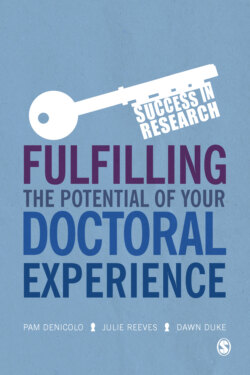Читать книгу Fulfilling the Potential of Your Doctoral Experience - Pam Denicolo - Страница 24
На сайте Литреса книга снята с продажи.
2 How Can You Make a Good Start?
ОглавлениеIn this chapter, we will consider how to:
Prepare for new roles
Research your supervisor and department/school
Develop good habits and work routines
Contact potential supporters
Identify resource sources
Read and begin writing
Review your expectations
Prepare a plan
The scientist and inventor Alexander Graham Bell is reported to have said, ‘Before anything else, preparation is the key to success,’ whilst the great teacher and philosopher Confucius taught that, ‘success depends upon previous preparation, and without such preparation there is sure to be failure’. Although more than two thousand years separate Confucius from Bell, they both recognised the same vital principal, which is that good ‘prep’ (as chefs say), or preparation, would seem to be an essential ingredient for success in most things, and this is especially true of research. As with any venture, adventure, expedition or activity, such as making a cake, it helps, first, to lay out your equipment, resources, maps, mixing bowls or other much needed materials that will help to get you started and, as with all longer journeys (making a cake is miniscule compared with a research project), you can lay down the basic preparation for your research project in the first 100 days.
As a professional researcher, you should think of undertaking doctoral research more as being appointed to a new (and important) job, rather than being a ‘student’ who largely is instructed and directed by others. We think language is very important in this respect because the terms you use to describe yourself and your work – because it is work – will influence your own and others’ perception of your status and standing. You may receive a good deal of instruction and direction in the first year or so, as a student might, but the aim and goal is for you to emerge, as a well-honed professional person with a doctorate! So, you should think of yourself in professional terms. Even if your department/university does not refer to you in this way, you can rise above any limitations by beginning your journey in a professional frame of mind.
There has been a good deal of focus and debate about the first 100 days in a new role, much of it generated by presidents of the United States. Ostensibly, it began with President Franklin D. Roosevelt (FDR) in 1933, when he used his first three months in office to lay out the foundations of his ‘New Deal’ by getting an incredible volume of legislation passed into law. Since then, ‘the first 100 days’ have been an important period for newly elected American presidents. However, as David Greenberg (2009) pointed out in a Wall Street Journal article entitled ‘The folly of the First Hundred Days’, the first 100 days are an ‘unreliable indicator of future performance’ and, although first impressions count for something, the success or failure in the first 100 days is no indicator of what may follow. In the case of US presidents, as Greenberg noted, although some got off to a flying start (he cites Reagan and FDR as two of the most effective), most performed their overtly significant work later in the presidency. We agree that it is unfair to judge an individual, even a new president, by the actions of their first 100 days in a job since we can all make mistakes in eagerness to make a good impression. Nevertheless, this period of the first few months is important for initial establishment in all roles. The early stage of any role is the time to get most of the basic requirements out of the way and to use the time to lay down good foundations for the future. Employers would certainly expect a new manager to ‘bed in’ within three months. You need to use this time to get some of the basic issues out of the way and to make sure you can comfortably and confidently manage the remaining years. A researchers’ first 100 days are only the start of a marathon, so you need to pace yourself. There are lots of views on the first 100 days on the internet and many publications on the subject; we list a few at the end of the chapter in the further reading.
